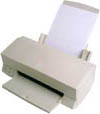The Appositive
Recognize an appositive when you find one.
An appositive is a noun or noun phrase that renames another noun right beside it. The appositive can be a short or long combination of words.
Read these appositive examples, all of which rename intruder:
The intruder, a cockroach, is crawling across the kitchen table.
The intruder, a large, inquisitive cockroach, is crawling across the kitchen table.
The intruder, a large, inquisitive cockroach with hairy legs, is crawling across the kitchen table.
The intruder, a large, inquisitive, hairy-legged cockroach that has spied my bowl of oatmeal, is crawling across the kitchen table.
Here are other examples:
During the dinner conversation, Clifford, the messiest eater at the table, spewed mashed potatoes like an erupting volcano.
My 486 computer, a modern-day dinosaur, chews floppy disks as noisily as my brother does peanut brittle.
Genette's bedroom desk, the biggest disaster area in the house, is a collection of overdue library books, dirty plates, computer components, old mail, cat hair, and empty potato chip bags.
Reliable, Diane's eleven-year-old beagle, chews holes in the living room carpeting as if he were still a puppy.
Punctuate the appositive correctly.
Nonessential Appositive
A nonessential appositive is always separated from the rest of the sentence with comma(s).
When the appositive begins the sentence, use a comma:
A hot-tempered tennis player, Robbie charged the umpire and tried to crack the poor man's skull with a racket.
When the appositive interrupts the sentence, use one comma in front and another comma after:
Robbie, a hot-tempered tennis player, charged the umpire and tried to crack the poor man's skull with a racket.
And when the appositive ends the sentence, use a comma:
Upset by the bad call, the crowd cheered Robbie, a hot-tempered tennis player who charged the umpire and tried to crack the poor man's skull with a racket.
Essential Appositive
If, however, the appositive is essential (readers need the information to distinguish which one of many the writer means), no punctuation is needed.
Although my sister Loretta disapproves of the on-court temper tantrums, she still thinks Robbie is cute.
Sister, a noun that can refer to many, many females, requires the clarification that the appositive Loretta provides. If we flip the order of the words, commas are necessary:
Although Loretta, my sister, disapproves of the on-court temper tantrums, she still thinks Robbie is cute.
©1997 - 2025 by Robin
L. Simmons
All Rights Reserved.
